Soil management in the spotlight at Normac demo day
Manufacturers from across the UK headed to Norfolk last week for the biennial Normac demonstration day, which took place on a 80ha plot at Hardingham Farms, Norfolk.
On show were ploughs, discs and drills, along with several more unusual inventions that included a corkscrew-style cultivator for improving tramline drainage and a soil sensing system to form field maps that can be used as the basis for variable-rate drilling.
LLand-ho Earthwake
Growers frustrated at seeing their topsoil wash away down field tramlines might be interested in Norwich-based Lland-ho’s latest drainage system.
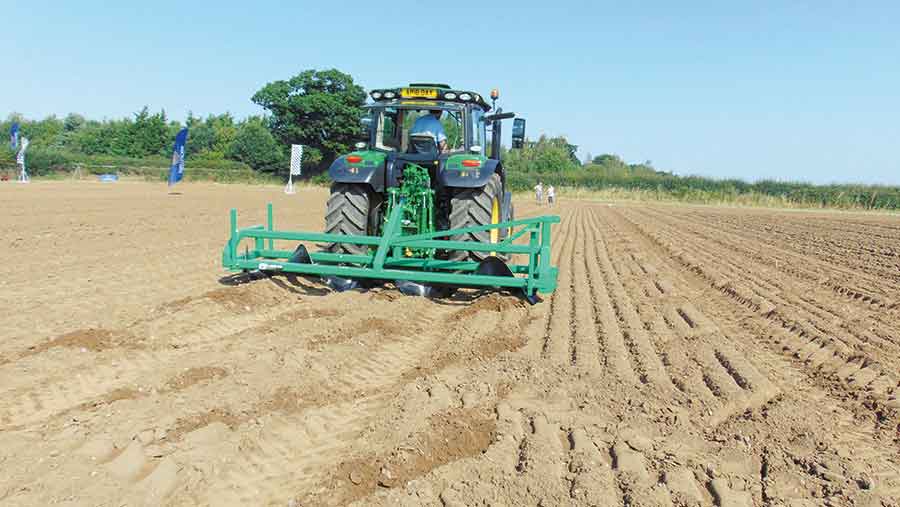
Although it looks bizarre, the implement creates angled drainage channels every two meters by rolling what looks like a giant corkscrew along the ground. This opens up the surface and directs run-off back into the soil, not only mopping up water, but also all the nutrients and pesticides that go with it.
The three-point linkage-mounted Earthwake has a 3.8m working width, which makes it a little over 4.1m wide. A second mounting point allows it to be taken down the road lengthways.
Overall weight is just under 700kg – which the company insists is enough to cut into the toughest soil – and a working speed of 12kph is achievable with just 80hp up front.
The machine lists at £7,750, but Lland-ho says it should pay for itself within four years, such is the quantity of valuable material washed away on the average farm.
See also: Latest high-speed disc cultivators set to work at Tillage-Live
Philip Watkins
Yorkshire manufacturer Philip Watkins has been producing all matter of bespoke agricultural equipment with his company for 20 years and its latest offering is a high-speed cultivator to encourage weed seeds to chit on post-harvest stubbles.
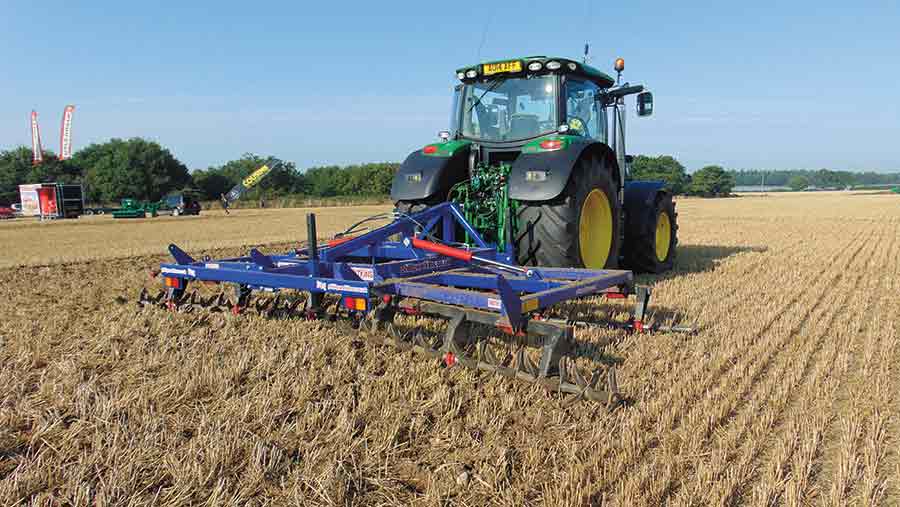
Similar in design to the Claydon Terrastar, it uses a rotating array of points to create divots in the top layer of the soil and encourage thorough surface mixing, incorporating muck, slurry or other biosolids to depth without churning up the surface too much.
It was the machine’s first outing after testing and the 6m version on show was easily pulled at 15kph by a 150hp tractor, so in theory 9ha/hour is achievable.
The company says a full costing needs to be done first, but is confident a 6m folding model with LED lights will be priced at about £12,500.
Dale Drills
Dale Drills was showing off its quick-to-adjust 5m Eco M, which it claims offers near-unrivalled versatility on the drill market.
The Lincolnshire manufacturer produces a range of seeders from 3-12m that all include its unique, low-draft coulter system that takes only 20-25hp/m to pull.
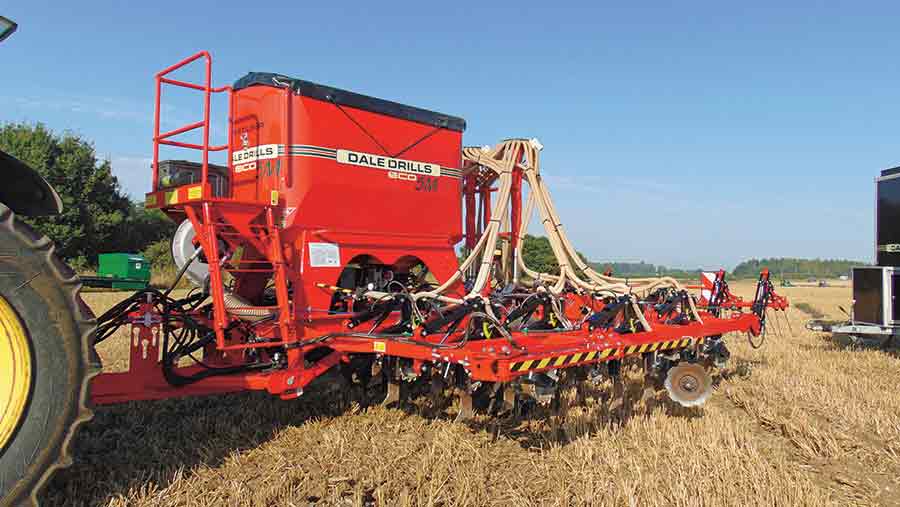
The design has two legs – the front places fertiliser slightly to the right of the seed dropped by the rear – and the depth of each assembly can be infinitely adjusted between 0-100mm. Row spacing can also be quickly shifted from 125-250mm and alternate coulters can be lifted out of work to create 500mm gaps.
Having a modular set-up allows the drills to be increased and decreased in size using the same frame. An all-singing, all-dancing version such as the one working at Normac – with split hopper, electronic metering and Isobus compatibility – is priced at £31,500 for a 3m model.
Bergmann RRW
Bergmann was showing its monster RRW 500 beet chaser, which was first unveiled at Agritechnica last year.
The colossal beet overloading wagon has a 50cu m capacity, so total weight will be close to 50t when fully loaded, all of which can be emptied in as little as 60sec with the help of a high-capacity hydraulic pump powered by the tractor’s pto.
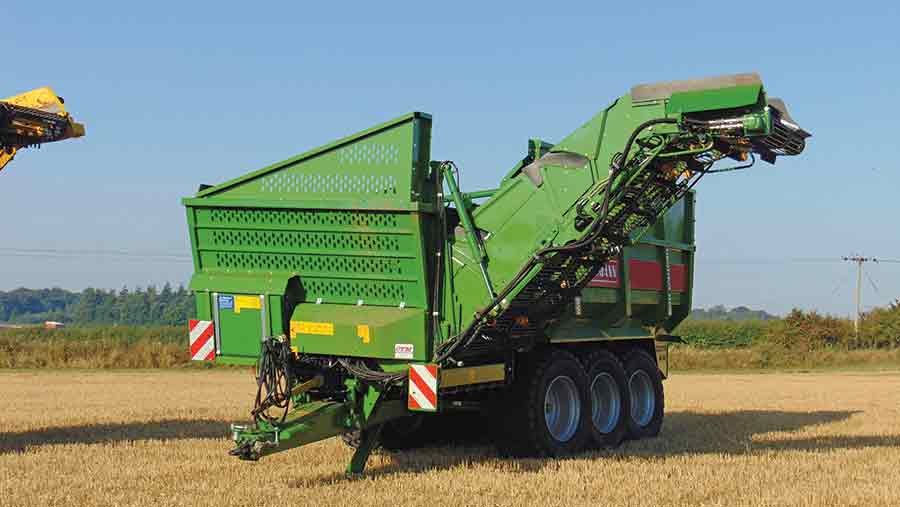
The chasers come with hydraulic steering to help spread weight across super-soft beet fields, while active hydraulic suspension should improve stability and keeps a minimum of 300mm ground clearance. It means when the trailer senses one wheel becoming stuck, it will automatically transfer weight to the others.
Using the unloading web instead of using a normal trailer to stack beet at the edge of fields eliminates the risk of ruts under the stack. Longer term, it should also mean the secondary loader is able to pick up more crop and losses would be reduced in the process.
There are currently two tandem-axle versions in the country that are set to work this season. The tri-axle model will need 350hp on the front, costs £125,000 and is aimed at those lifting about 800ha, but there’s no reason why it can’t be used for onions or potatoes too.
Gregoire Besson plough
Gregoire Besson’s RW6 plough with double depth-wheel drew a fair bit of attention and was coupled with the company’s Andpak roller consolidator.
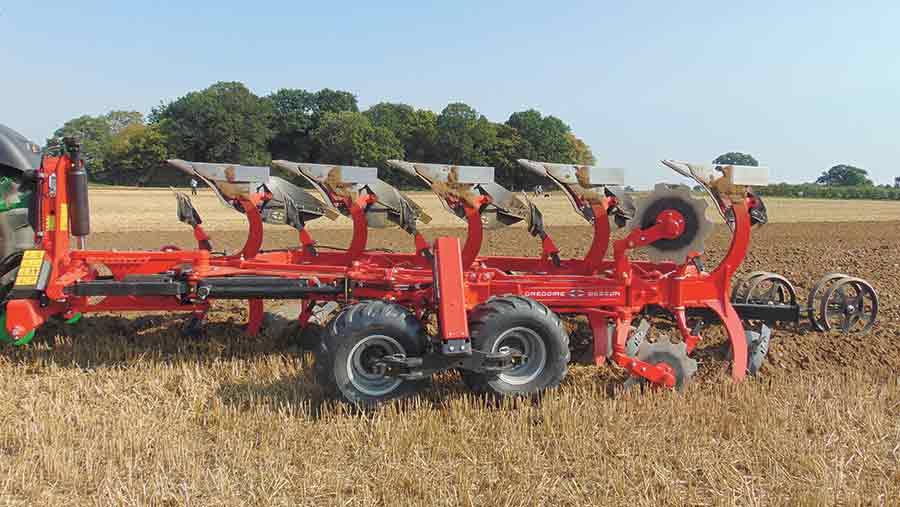
The RW6 comes in four-, five- and six-furrow form, has three-point linkage suspension, a headstock-to-frame parallelogram linkage and hydraulic independent front furrow adjustment.
Its hydraulic double wheel arrangement rides over lumps and bumps in the field to keep things more level than a single wheel, as well as improving stability on the road. The big advantage, says Besson, is that it can transfer a lot more weight to the press on the other side.
The new type of press is compact but manages to provide more consolidation than the regular configuration. The linkage forces the weight of the whole plough onto the rollers, and also means no more fiddling around telegraph poles and painful headland runs.
A fully-hydraulic RW6, including the double-depth wheels and press, will set you back £25,000.
SoilQuest
Agronomy specialist Agrii revealed it is offering a new field-based service with its SoilQuest Veris EC scanner, which is designed to monitor soil conditions to vary drilling rates more accurately.
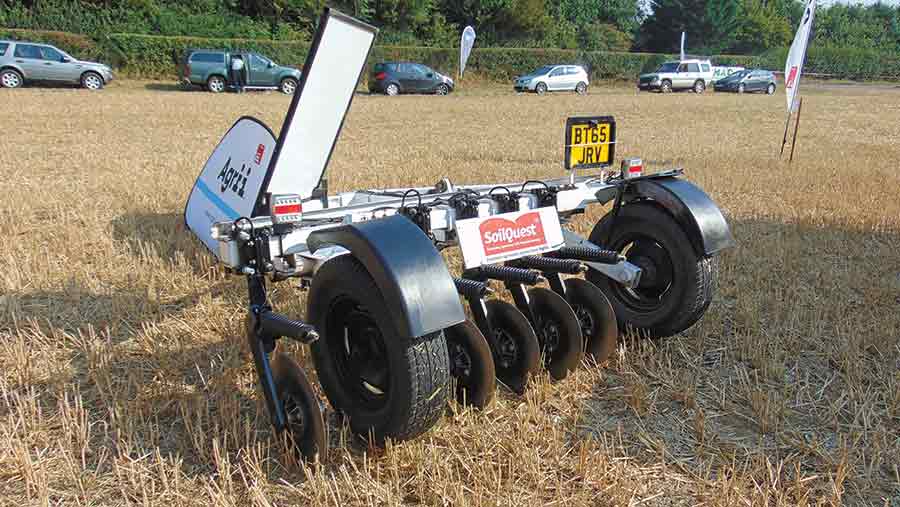
The scanner is towed along by a 4×4 and has a series of discs in 300-900mm bands that cut into the ground to measure electrical resistance.
The recorded conductivity is related to a number of soil properties that aid in plant growth, including texture, water-holding capacity and its ability to regulate temperature.
Coupled with the knowledge of the farmer/agronomist, the information can be used to make a map that can eventually be divided into management zones and used as the basis for jobs such as variable-rate drilling.
Agrii prices each job separately and says it tailors the service to each farm, so prices can vary considerably. If you wanted to buy the machine for yourself it will set you back anywhere between US$11,000-US$34,000 (£9,800-£25,600) depending on spec, but it requires a stack of software and know-how to actually make use of it.

